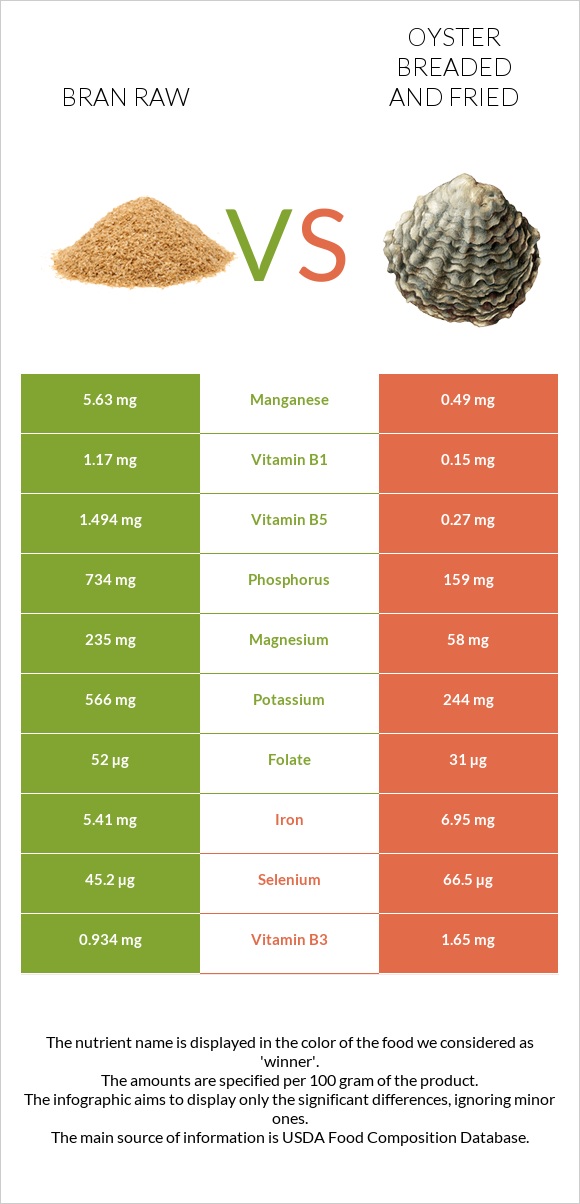Bran raw vs. Oyster breaded and fried — In-Depth Nutrition Comparison
Compare
Differences between bran raw and oyster breaded and fried
- Bran raw has more manganese, vitamin B1, phosphorus, magnesium, and vitamin B5, while oyster breaded and fried has more zinc, vitamin B12, copper, and selenium.
- Oyster breaded and fried's daily need coverage for zinc is 764% higher.
- Oyster breaded and fried contains 11 times less manganese than bran raw. Bran raw contains 5.63mg of manganese, while oyster breaded and fried contains 0.49mg.
- Oyster breaded and fried has a lower glycemic index. The glycemic index of oyster breaded and fried is 0, while the glycemic index of bran raw is 56.
The food types used in this comparison are Oat bran, raw and Mollusks, oyster, eastern, cooked, breaded, and fried.
Infographic

Infographic link
Mineral Comparison
Mineral comparison score is based on the number of minerals by which one or the other food is richer. The "coverage" charts below show how much of the daily needs can be covered by 300 grams of the food.
| Contains more MagnesiumMagnesium | +305.2% |
| Contains more PotassiumPotassium | +132% |
| Contains more PhosphorusPhosphorus | +361.6% |
| Contains less SodiumSodium | -99% |
| Contains more ManganeseManganese | +1049% |
| Contains more IronIron | +28.5% |
| Contains more CopperCopper | +965.5% |
| Contains more ZincZinc | +2701.6% |
| Contains more SeleniumSelenium | +47.1% |
Vitamin Comparison
Vitamin comparison score is based on the number of vitamins by which one or the other food is richer. The "coverage" charts below show how much of the daily needs can be covered by 300 grams of the food.
| Contains more Vitamin EVitamin E | +∞% |
| Contains more Vitamin B1Vitamin B1 | +680% |
| Contains more Vitamin B5Vitamin B5 | +453.3% |
| Contains more Vitamin B6Vitamin B6 | +157.8% |
| Contains more Vitamin KVitamin K | +∞% |
| Contains more FolateFolate | +67.7% |
| Contains more Vitamin CVitamin C | +∞% |
| Contains more Vitamin AVitamin A | +∞% |
| Contains more Vitamin B3Vitamin B3 | +76.7% |
| Contains more Vitamin B12Vitamin B12 | +∞% |
All nutrients comparison - raw data values
| Nutrient |  |
 |
DV% diff. |
| Zinc | 3.11mg | 87.13mg | 764% |
| Vitamin B12 | 0µg | 15.63µg | 651% |
| Copper | 0.403mg | 4.294mg | 432% |
| Manganese | 5.63mg | 0.49mg | 223% |
| Vitamin B1 | 1.17mg | 0.15mg | 85% |
| Phosphorus | 734mg | 159mg | 82% |
| Fiber | 15.4g | 62% | |
| Magnesium | 235mg | 58mg | 42% |
| Selenium | 45.2µg | 66.5µg | 39% |
| Cholesterol | 0mg | 71mg | 24% |
| Vitamin B5 | 1.494mg | 0.27mg | 24% |
| Iron | 5.41mg | 6.95mg | 19% |
| Carbs | 66.22g | 11.62g | 18% |
| Sodium | 4mg | 417mg | 18% |
| Protein | 17.3g | 8.77g | 17% |
| Vitamin A | 0µg | 90µg | 10% |
| Fats | 7.03g | 12.58g | 9% |
| Potassium | 566mg | 244mg | 9% |
| Vitamin B6 | 0.165mg | 0.064mg | 8% |
| Saturated fat | 1.328g | 3.197g | 8% |
| Vitamin E | 1.01mg | 7% | |
| Choline | 32.2mg | 6% | |
| Monounsaturated fat | 2.376g | 4.702g | 6% |
| Folate | 52µg | 31µg | 5% |
| Vitamin C | 0mg | 3.8mg | 4% |
| Vitamin B3 | 0.934mg | 1.65mg | 4% |
| Polyunsaturated fat | 2.766g | 3.313g | 4% |
| Vitamin K | 3.2µg | 3% | |
| Calories | 246kcal | 199kcal | 2% |
| Vitamin B2 | 0.22mg | 0.202mg | 1% |
| Net carbs | 50.82g | 11.62g | N/A |
| Calcium | 58mg | 62mg | 0% |
| Sugar | 1.45g | N/A | |
| Tryptophan | 0.335mg | 0.105mg | 0% |
| Threonine | 0.502mg | 0.365mg | 0% |
| Isoleucine | 0.668mg | 0.396mg | 0% |
| Leucine | 1.374mg | 0.638mg | 0% |
| Lysine | 0.76mg | 0.582mg | 0% |
| Methionine | 0.335mg | 0.199mg | 0% |
| Phenylalanine | 0.908mg | 0.352mg | 0% |
| Valine | 0.964mg | 0.409mg | 0% |
| Histidine | 0.41mg | 0.175mg | 0% |
| Omega-3 - EPA | 0g | 0.202g | N/A |
| Omega-3 - DHA | 0g | 0.218g | N/A |
| Omega-3 - DPA | 0g | 0.048g | N/A |
Macronutrient Comparison
Macronutrient breakdown side-by-side comparison
Protein:
17.3 g
Fats:
7.03 g
Carbs:
66.22 g
Water:
6.55 g
Other:
2.9 g
Protein:
8.77 g
Fats:
12.58 g
Carbs:
11.62 g
Water:
64.72 g
Other:
2.31 g
| Contains more ProteinProtein | +97.3% |
| Contains more CarbsCarbs | +469.9% |
| Contains more OtherOther | +25.5% |
| Contains more FatsFats | +78.9% |
| Contains more WaterWater | +888.1% |
Fat Type Comparison
Fat type breakdown side-by-side comparison
Saturated fat:
Sat. Fat
1.328 g
Monounsaturated fat:
Mono. Fat
2.376 g
Polyunsaturated fat:
Poly. Fat
2.766 g
Saturated fat:
Sat. Fat
3.197 g
Monounsaturated fat:
Mono. Fat
4.702 g
Polyunsaturated fat:
Poly. Fat
3.313 g
| Contains less Sat. FatSaturated fat | -58.5% |
| Contains more Mono. FatMonounsaturated fat | +97.9% |
| Contains more Poly. FatPolyunsaturated fat | +19.8% |